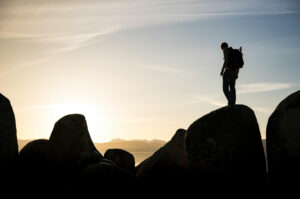
On today’s crowded social media platforms, if you want to make an impact you need to create alliances to reach new people.
This is where many organizations fail, instead relying on the same old partners to disseminate and amplify their campaigns, without going outside of their comfort zone and expanding their circle of influence.
That is what Patagonia, the sports clothing brand, is successfully doing to support environmental causes. It is engaging with activists as well as outdoor sports enthusiasts, in effect building bonds between their own sports communities and like-minded environmental groups.
These two interest groups are not usually in contact, so that’s where Patagonia comes in — helping to create a bridge for new hybrid communities to take shape.
While Patagonia is not a non-governmental organization (NGO), it is using its influence and marketing expertise to galvanize others on its mission to address the climate crisis. Building a strong community is an integral part of this strategy.
“We’re definitely a connector and an amplifier,” said Lauren Henshaw, Digital Community Manager at Patagonia.
Patagonia supports hundreds of non-governmental organizations, helping to align the clothing company with a global community of environmental activists.
“Our NGOs are an incredible resource for knowledge and expertise that we learn from, helping to connect us with really important issues,” added Henshaw.
Following the announcement of Patagonia Founder Yvon Chouinard last year to transfer the company’s ownership to a public trust dedicated to fighting the environmental crisis, these relationships are even more strategic for the company’s mission.
It was in this context that I met with Lauren Henshaw recently to hear more about their approach to digital advocacy. In this passionate interview, Henshaw touches on the importance of online collaboration and community-building while exploring Patagonia’s future role as one of the world’s leading activist brand.
Q. Patagonia founder Yvon Chouinard recently announced that he has donated the company and, as he famously said, the earth is now your only shareholder. What has been the impact of this on Patagonia’s communications?
It has given us a real sense of clarity on what we do. Our mission statement is that we are in business to save our home planet, and now the earth is our only shareholder. We are really putting our money where our mouth is.
The response has been exciting! It has inspired people and shown them that change is possible and that there is a new way of working that can encourage others to follow in our footsteps.
Q. How does digital communications support community initiatives like “We the Power” and “Vanishing Lines”, particularly to bring people together and create a sense of connectedness?
We use digital as a tool for reaching new audiences, diversifying who we’re talking to, and making sure that environmental messages are being heard.
We have a strong and powerful voice that allows us to grow the awareness on initiatives like community energy and issues like ski resort expansion (the focuses of the two films you mentioned). By increasing this awareness through digital we hope to spark real-world action that can help drive positive change.
Essentially we lend our voice and platform to the groups leading the charge.
By increasing this awareness through digital we hope to spark real-world action that can help drive positive change.
Lauren Henshaw @Patagonia Tweet
Q. Do you see Patagonia as a connector that is bringing together activists with sports enthusiasts and NGOs?
Yes, we’re definitely a connector and an amplifier.
We can’t be experts on everything, particularly when it comes to really nuanced or complex environmental topics. So we constantly learn from NGOs about the issues that we care about. Our NGOs are an incredible resource for knowledge and expertise that we learn from, helping to connect us with really important issues.
We are proud to be supporting their work. As a brand, we are able to use the skills and resources we have and channel them toward the work and expertise that NGOs are doing.
Q. You are a sports brand, with seven core sports. How do you encourage sports audiences to become interested in the environment and protect the areas that they play in?
We are known for our storytelling, taking complex issues and distilling them into clear, inspiring actionable messages for different communities.
That can be the protection of mountains and winter for those that go back country touring, protecting forests for those that love mountain biking through trails, or protecting the ocean for those that enjoy surfing. We are trying to bridge those gaps between the sports and environmental community.
We feel that if you enjoy outdoor sports, you should also give back to the earth by fighting to protect the place you play in. This is a really big part of our communications: we want to help our community develop a deeper connection with the places they love.
In digital, we have the strength of being able to be everywhere and meet people where they are. We have beautiful content that also allows us to capture people’s attention. They might start off watching a film about a surfer and then end up on our website where they can learn more about the importance of neoprene-free wetsuits.
Our NGOs are an incredible resource for knowledge and expertise that we learn from, helping to connect us with really important issues.
Lauren Henshaw @Patagonia Tweet
Q. What would be one of your most successful campaigns and why?
Overall, I believe that our most successful campaigns have been those that have allowed us to build meaningful connections with our audience and create positive action.
Our hope is to continue to use our presence online to impact change beyond our screens, for example we have successfully rallied millions of people behind a campaign to save wild rivers; helped spread the word about the power of community energy; and worked with Patagonia Action Works to link skilled volunteers to hundreds of grassroots organizations all across Europe.
And in a period of time defined by misinformation and polarization, Patagonia’s presence online has focused on positive change. From holding power to account to promoting constructive conversations in our communities, we’ve used social media as a tool to form connections, drive impact, and encourage action wherever they can.
Our hope is that the success of our campaigns can be measured by the positive change they help catalyse in the real world.
Patagonia launched its first global environmental campaign around a European initiative, Save the Blue Heart of Europe, to protect wild rivers in Eastern Europe from over 3,000 planned hydropower projects.
Latest blog posts

Top 5 communications challenges for 2026 – and how to overcome them
Discover the top five communications challenges facing social impact teams in 2026 and learn practical steps to address them.

Find Out How AI Narration Can Boost Your Communications
Discover how AI narration for social impact communications is transforming content, boosting reach, accessibility, and engagement.

Why authentic storytelling will always beat AI
Employee stories get 500% more engagement than brand posts. Learn why authentic storytelling beats AI content.
- Written by: Nicholas Bruneau
- Posted on: January 11, 2023
- Tags: community management, Digital Advocacy

